Russia and China May Be Allying Against North Korea : A Well Thought Out Scream by James Riordan
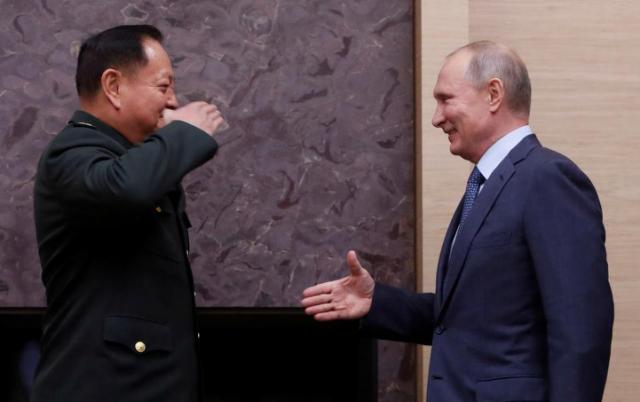
They both may embrace Communism as their form of government, but there have always been vast differences between Russia and China. The brutal purist form of communism adopted by Mao Te Sung, the leader of the Chinese Revolution in the forties resulted in tens of millions of deaths. The people were expendable in Mao’s view and it has only been since his death in 1079 that the government’s vise-like grip on the lives of its people has eased somewhat. But such changes are virtually nothing when compared with the new Russia, where outright Capitalism has produced great wealth where there was much poverty. And with the ease of tight government control also came vice and organized crime and Russian gangsters are now some of the most powerful in the world. So what would it take today for such divergent countries to come together — the same thing that always brings such countries together – mutual threat or in this case the nuclear dangers boasted loudly by North Korea’s madman ruler, Kim Jong-un. Last week, Russia and China conducted computer-generated air defense drills in a move that Moscow claims has made the relationship between the two nations even stronger. The five day drill drafted servicemen from both militaries and was headed by the deputy chief of the Russian air force, Pavel Kurchenko, and the Chinese air force’s top commander, Ma Zhenjun.
Russia’s Ministry of Defense issued a statement commending the drill, which officially finished Saturday, but did not reveal any details of the scenario it addressed. “The leaders of the exercises stressed that all the tasks assigned to the military specialists of both countries were fully met, and a completely new level of interaction between all levels of command and control from headquarters to unit commanders was achieved,” the statement from Russia’s ministry to state news agency Itar-Tass reported.
Like China, Russia is a nuclear power, a permanent member of the United Nations Security Council and a neighbour of North Korea with established lines of communication to Pyongyang. During World War II, Kim Il-sung (Kim Jong-un’s grandfather) served as a captain in the Red Army; Kim Jong-il (Kim Jong-un’s father) travelled to Russia several times in the early 2000s. President Vladimir Putin of Russia himself went to Pyongyang in 2000.
Although he failed to work out a deal to limit North Korea’s missile program at the time, his visit helped restore links with Pyongyang, which had been neglected after the fall of the Soviet Union.
Russia is not among the countries most directly or most intimately affected by North Korea’s nuclear ambitions, such as the United States, South Korea or China. And unlike China, Russia never was an imperial overlord on the Korean Peninsula. Moscow may have less direct influence with Pyongyang than does Beijing, but it evokes far less nationalistic resentment and suspicion among North Koreans.
The bombing exercise was carried out in response to the launch of a missile over Japan by Kim Jong-un’s regime. Russia is usually seen as relatively unimportant to most discussions about the North Korea nuclear crisis, yet it is in a unique position to help de-escalate it.
In any discussion of how to handle the increasing belligerence of North Korea’s leader, Kim Jong-un, attention usually turns to China. Beijing and Pyongyang have long been allies, and China is North Korea’s main trade partner. But for a host of strategic reasons, there are inherent limits to what Beijing will do. It is wary of the fallout it would suffer if North Korea imploded, and it wants to preserve a buffer between itself and the United States forces based in South Korea.
Despite rising tensions between Moscow and Washington – over Russia’s interventions in Crimea and Syria, and the very principles of the world order – Russia has voted twice in recent weeks at the United Nations to impose sanctions on North Korea. In the summer of 2015, in the midst of the crisis over Ukraine, Moscow was careful not to do anything that might derail the Obama administration’s efforts to cinch a nuclear deal with Iran.
Russia, in other words, is not simply the spoiler it has often been described as in recent years. It plays its hand with Washington much more subtly than that — often adopting an adversarial pose, especially of late, but sometimes a cooperative one. And it has good reason to help with North Korea.
Russian President Vladimir Putin meets with China’s Central Military Commission Vice Chairman Zhang Youxia at the Novo-Ogaryovo state residence outside Moscow, Russia December 7, 2017. Sergei Karpukhin/Reuters.
Russia also has a clear and immediate interest in helping de-escalate the current crisis. Vladivostok, its gateway to the Asia-Pacific region, the headquarters of its Pacific Fleet and a hub for its energy trade, is just a couple hundred miles away from several of North Korea’s nuclear and missile sites. Any malfunction or other mishap with North Korea’s nuclear tests or missile launches could mean contamination in Russia itself. The Russian government is also eager to curb the further deployment of American missile-defence systems in South Korea and Japan, which both those countries are pursuing to protect themselves against North Korea.
North Korea will not denuclearise; it’s too late for that. Neither will it ever formally be recognised as a nuclear power. But it will eventually have crude nuclear weapons with which to strike United States territory.
Sanctions, no matter how strict, will not stop Pyongyang from pursuing its program, which it sees as the key to its very survival; as Putin said recently, North Koreans will “eat grass” before they give up nuclear weapons. Pyongyang’s latest missile launch on Friday was a direct rebuke to the new sanctions, notably on oil imports, that the UN Security Council passed last Monday.
This is not to say that sanctions are a mistake. They remain a valuable expression of collective condemnation and reassert the goal of nuclear non-proliferation. But they will not halt North Korea’s nuclearisation.
A total blockade of the country might, but it is too risky to even attempt. It could push North Korea to start a war or cause the country’s collapse, a prospect that China, for one, cannot tolerate.
And so the only viable strategy left is to convince the North Korean leadership that it already has the deterrent it needs, and that going beyond that — by developing more nuclear weapons and longer-range missiles — would only be counterproductive.
This is where Russia comes it: it can help nudge Pyongyang toward strategic restraint, and help defuse tensions in the meantime, by offering it new economic prospects.
One project that has been discussed in the past involves building gas pipelines from Russia to South Korea through North Korea. Another would be to restore an old rail link that used to connect South Korea to the Tran-Siberian. Both would generate transit fees, in foreign currency, for Pyongyang. As another expression of good will, the Russian government could also authorise more North Koreans to work in its eastern provinces: an estimated 30,000 to 50,000 already do, many as construction workers and labourers.
The North Korean economy is doing better than is commonly thought. Its gross domestic product has grown recently — by 3.9 per cent between 2016 and 2017 — and market forces are emerging, for the trade of food and real estate, for example. That means not only that North Korea may be better able to withstand sanctions today than it was in the past, but also that economic overtures could hurry its transformation along — and perhaps in time soften its stance internationally.
Washington and Pyongyang will eventually need to resume direct talks. With neither party ready for that yet, at first secret contacts will have to be organised in third countries. In the meantime, de-escalation is the order of the day, and Russia one of its unlikely brokers.
North Korea has released a photo it claims is of the pariah nation’s latest ballistic missile test. Released by the state-run Korean Central News Agency (KCNA), the photos show an intermediate range Hwasong-12, the same type of missile launched over Japan this week. The photo could not be independently verified.
North Korean leader Kim Jong-un said his country’s “final goal” was “to establish the equilibrium of real force with the US and make the US rulers dare not talk about military option.” He added that sanctions would not stop his country from achieving that goal. “We should clearly show the big power chauvinists how our state attains the goal of completing its nuclear force despite their limitless sanctions and blockade.”
Russian forces in the country’s far east have had a busy year, with official figures released by the military earlier this month showing that the Pacific fleet has spent four times longer at sea than planned. Moscow gave no reason for this, but noted that the single busiest region where it was taking place was Primorye, Russia’s only territory bordering North Korea.
The North Korean regime has carried out a series of missile tests this year, stoking fears that its deteriorating relationship with the U.S. and its nearby allies could descend into war. Russia and China have presented a united front on North Korea so far, claiming that they object to Pyongyang’s nuclear military program but refusing to sever ties with the state. Both have called for the U.S. to pledge that it will also scale back its military presence in the region.
Russian President Vladimir Putin’s top security adviser, Nikolai Patrushev, said at the start of the month that Moscow is “preparing” should war erupt around North Korea but stressed: “We must not allow this.” Commentary from North Korea’s official news agency has said in the past that only the country’s missiles are intended to specifically deter the U.S., not Europe or any country, even if they are in range.
Mr Kim was shown beaming as he watched the missile fly from a moving launcher in photos released by the agency, surrounded by several officials. North Korean leader Kim Jong-un celebrates what was said to be the test launch of an intermediate range Hwasong-12 missile (AP)
“The combat efficiency and reliability of Hwasong-12 were thoroughly verified,” said Kim as quoted by KCNA. The North’s goal of completing its nuclear force had “nearly reached the terminal”, he added.
North Korea has launched dozens of missiles under Kim’s leadership as it accelerates a weapons program designed to give it the ability to target the United States with a powerful, nuclear-tipped missile. After the latest missile launch this week, White House National Security Adviser HR McMaster said the United States was fast running out of patience with North Korea’s missile and nuclear programs.


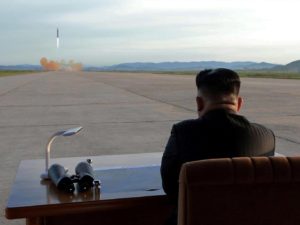
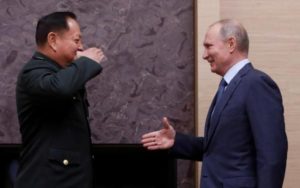
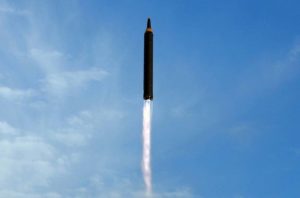
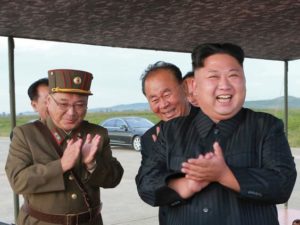
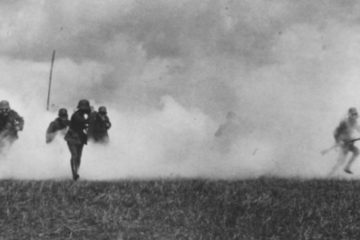
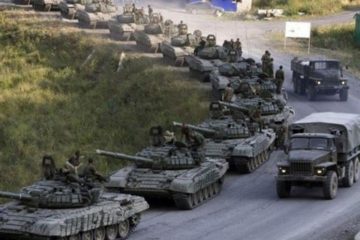
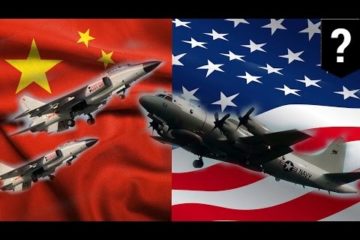
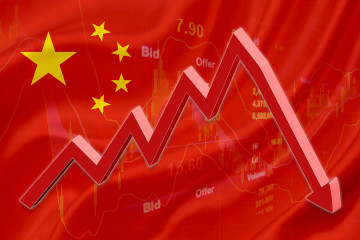

No Comment